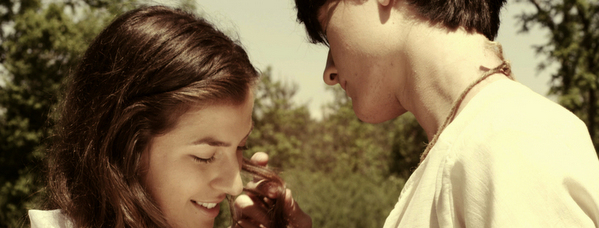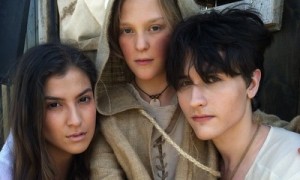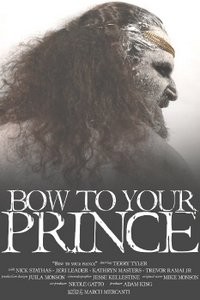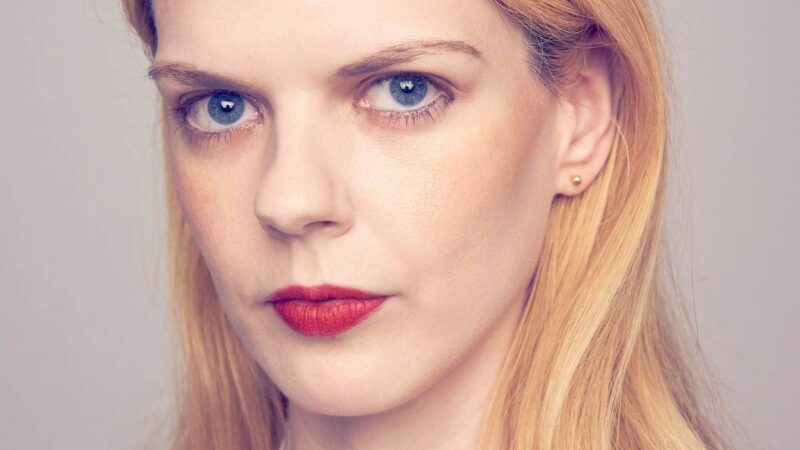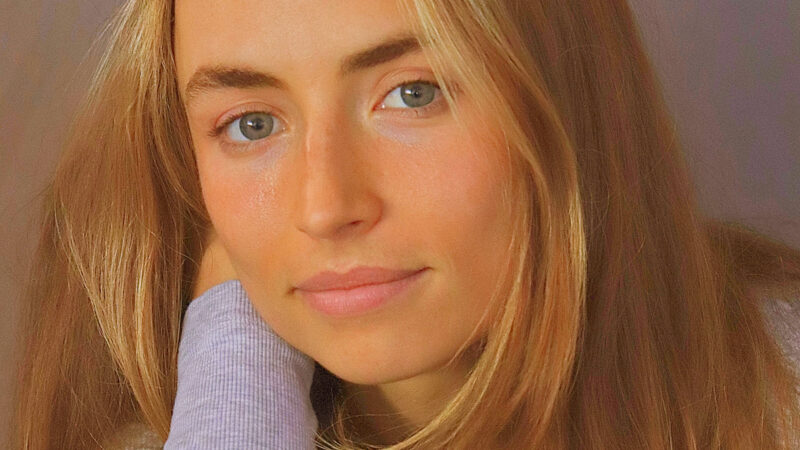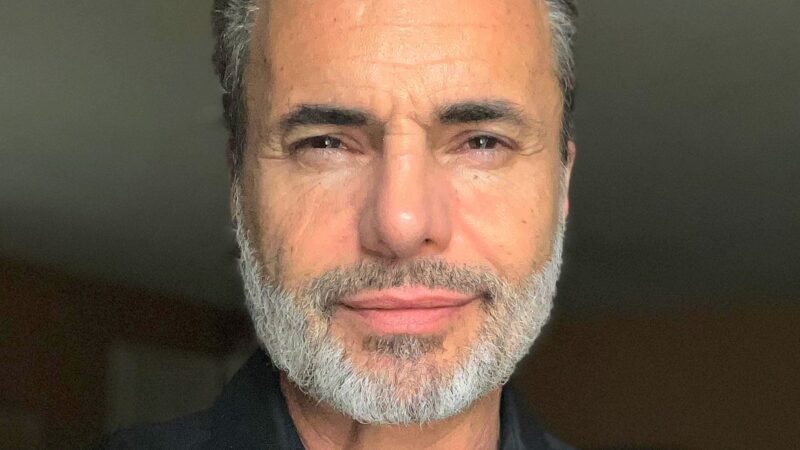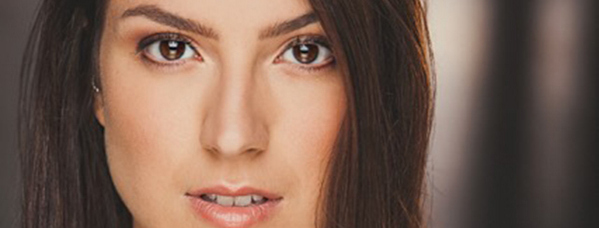
When I was 9 years old I knew that I wanted to pursue a career in acting, but at that age I didn’t know how to turn my dream into a reality. I was born and raised in a small town on the East Coast of Canada, which was very challenging as the film industry was almost non-existent at the time. Not being able to take any type of acting classes, I enrolled myself into vocal lessons where I participated in numerous music festivals and singing competitions throughout my teenage years. However, when the opportunity presented itself to be a part of the stage production ‘Grease: The Musical’ it was clear to me, while being on stage, that acting was exactly what I wanted to do as the effect I had on people to experience different emotions, not only with my voice but with my acting, was immensely rewarding.
• Hair & makeup time 💞 • #actor #onset #losangeles pic.twitter.com/7zqHFQdnd9
— Kathryn Masters (@kathrynfmasters) August 9, 2015
Did you study acting
Yes! Although no formal training is strictly required to become an actor/actress, it was very important for me, to learn how to improve my skills as I felt like I lacked knowledge on all the different types of techniques and methods actors regularly used. In 2010, I started my bachelor’s degree at the ‘Université de Moncton’ majoring in Theatre arts, but quickly recognized that acting for Film & Television was what I really wanted to pursue. I then graduated at the Toronto Film School with a diploma in Acting for Film, TV & Theatre. This intensive program blended a focus on film acting with the critical foundations of stage technique. Their specific classes helped me explore and understand each individual aspect of acting.
What acting technique do you use
Having worked with many different acting techniques over the years, I’ve created for myself an acting toolbox, which allows me to choose the specific technique that I feel is appropriate for the required preparation at that moment. I don’t necessarily limit myself to a single method because most techniques have a common fundamental base; the different methods just allow you to explore your character using different approaches. Even though there are numerous great techniques to choose from, I tend to lean towards Meisner because I love how it’s all about listening, responding and focusing on the other actors all while remaining present. I truly believe in the saying “acting is reacting”.
What wrong impressions do actors hold about acting
A lot of up and coming actors believe that they can reach stardom overnight. Although, this has happened to certain individuals, it doesn’t happen to everyone and what some people fail to understand is that acting really is a full-time job that you have to train for just like any profession. It is important to always be taking classes, workshops, working with coaches etc. to regularly be molding and shaping your craft. Contrary to what some people may believe, acting is a muscle that continuously needs to be exercised.
Do you take courses to improve your craft
Absolutely! I believe that there’s always room for growth and improvement, therefore it’s so important that we, as actors, never stop training. I’m currently taking several acting classes such as, on-camera auditioning, script analysis, improv and voice classes. You should always be seeking acting training to develop your strengths and increase your weaknesses.
What acting books do you read
I have read a wide range of acting books, however my top 2 would have to be Stanislavski’s “An Actor Prepares” as well as “Audition” by Michael Shurtleff.
How do you keep fit as an actor
Physically, my body is my greatest instrument so it’s very important for me to keep it working right at all times. Whether it consists of eating healthy or maintaining a regular fitness regimen, I try to keep everything balanced as much as possible. In the past, vocal instructors have told me that as beneficial going to the gym is, it also has its cons when it comes to using your voice. Ex: If I were to do some crunches or sit-ups, I would be focusing on tightening the muscles in my core, however the art of acting requires us to let go and relax those same muscles in order for us to have full access to our diaphragm. Once I’ve completed a workout, I always take a few minutes to reconnect with my body afterwards.
Mentally, it is important that I surround myself with positivity in order for me to have peace of mind and be able to give it my all.
When you’re offered a role, what do you do next
When offered a role, I’ll read the script as many times as needed followed by highlighting every single thing I can find about my character within the script. I then ask myself the 9 W’S (Who am I? What time is it? Where am I? What surrounds me? What are the given circumstances? What is my relationship? What do I want? What is in my way? What do I do to get what I want?). If certain information isn’t provided I simply make it up! I then break down the scenes into beats and figure out what my intentions are.
How do you take a character in a script to a honest, believable and breathing person
Depending on the character, I sometimes find it easier to use my muscle memory to find that connection and believably between the character and my personal life and experiences.
How do you stay fresh on set
Again, depending on the character, I usually adjust to how I feel in the moment. Sometimes I just want to be alone and other times I feel like interacting with the rest of the cast between takes.
Describe a memorable character you played
One of the most memorable characters I’ve played was the role of Adisa in the critically acclaimed short film “Bow To Your Prince” (2014). It was such a great experience having to embody and understand the behavior and mentality of people living in this historic / medieval time. In the film, the sinister Prince Kafu has cursed Adisa, so it was definitely a challenge but the outcome couldn’t have been more satisfying.
Explain one creative choice you took on set
A few years ago I was cast in a principal role in the stage adaptation of Neil Simon’s “The Good Doctor”. It was a comedy that consisted of a series of short stories and other works by the Russian author Anton Chekhov. I had a blast playing the evil Mistress in “The Governess”. The director envisioned for the Mistress to have an over the top personality so I immediately thought of Ursula in The Little Mermaid. Thinking of this character, I used her very dark sinister villain ways and wicked sense of humor to bring my character to life.
What do you want most from a director
I love when directors are able to communicate their needs and wants; when they’re able to have a clear vision on what they’re looking for. On the other hand, it feels great when directors give actors the freedom to improvise and try new things.
What actors do you long to work with
Matthew McConaughey
Why
I love how he brings so many dimensions to his roles. He always finds the corky and playful side within his characters no matter how dramatic or comedic the performance. He’s such an intelligent actor that has powerful onscreen presence.
What advice would you give to actors
There will always be people who will TRY to bring you down but just use their negativity as fuel to your fire. Believe in yourself and in your dreams. Persistency is key.
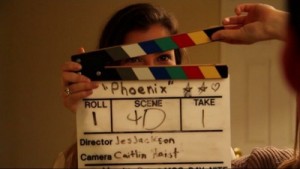 Briefly write about your career
Briefly write about your career
Some of my accomplishments include being in ‘The Bandit Hound’ (2015) starring Catherine Bell, Judd Nelson and Lou Ferrigno. I’ve been a lead in a very successful and critically acclaimed short film called ‘Bow To Your Prince’ (2014) which has won numerous awards nationwide. I also just completed filming another successful film called ‘Come Autumn’ (2015) and I’ll be starring in the film ‘Big Break”(2016). Some of my future projects include starring in Michelle Danner’s upcoming documentary as well as making an appearance in the web series ‘Uncensored Hollywood’.

